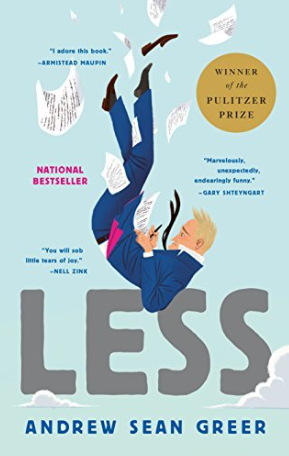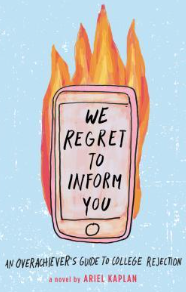Less Review

Lost and confused after his boyfriend of nine years breaks up with him and gets engaged to someone else, aging writer Arthur Less needs to find a way to avoid going to the wedding. Luckily, he has been receiving invitations to literary conferences and college talks around the world. Though he knows that he has only been invited to these conferences to talk about another of his ex-boyfriends, Pulitzer-prize winning poet Robert Brownburn, or to interview other, more famous writers – not ever to talk about his own failed career – accepting the invitations would mean that he would be out of the country for the wedding. So he does.
From there, Arthur Less is then thrown, alone, into a global tour he never intended to go on, as chronicled in the Pulitzer-prize winning novel Less by Andrew Sean Greer. Though his encounters are told mostly in a sarcastic manner, they also touch on serious and widely relatable topics of alienation and insecurity while keeping an appropriate balance between the two, allowing for Less to leave an undeniable impact on the reader while still being an entertaining story as well.
One unique aspect of Less is the narrator. The events of the story appear to be told from the third person point of view, but throughout the novel this is contradicted when the narrator suddenly inputs his own opinions or experiences with Less from the first person perspective. This emphasizes Less’s feelings of alienation in that it makes the reader feel further from him and also further from the unknown narrator, which helps the reader to further empathize with Less in that they are both experiencing similar feelings at the same time. Additionally, this style of narration contributes to the sarcastic tone of the novel through anecdotes often made by the narrator about Less. The narrator remarks at one point: “Strange, though; because he is afraid of everything, nothing is harder than anything else. Taking a trip around the world is no more terrifying than buying a stick of gum.” This is both a humorous break for the reader and helps them to understand Less’s struggles, contributing to the overall balance of the novel. It is also enjoyable and engaging for the reader to try and figure out the identity of the narrator as the novel progresses.
The names in the novel also manage to both contribute to its sarcastic tone and the development of the main character’s problems. The most obvious is included in the title – Arthur’s last name, Less. The book frequently mentions Arthur’s feelings of insecurity throughout the book – about his age, his talent, and his relationships – which are evident both in his actions and his thought process. This insecurity takes place as a central topic of the novel, and so it’s fitting that Arthur’s own name hints at his feelings of being inferior to others and “less” than he was in his youth. Also, the unnamed narrator often refers to him as “our hero” despite Less being a thoroughly flawed character who has been wronged by many people but also wronged many others himself. This sarcastic comparison makes Less seem even more pitiful and insecure to the reader. This is not only applied to how Less is described, however, but how Less views others as well. He often forgets the names of others, even his former lovers. This defends both his feelings of being alienated from others and his flawed nature in that he is not good at maintaining relationships with others. This flaw, however, makes him a more relatable character and causes the reader to be more drawn to him and hoping for his success rather than make them not enjoy reading about his journey.
Though the novel is uneventful and often teases at interesting events that do not end up happening, this only adds to its humor. Overall, through Less, Andrew Sean Greer has excellently executed both humor and an analysis of human suffering, and it is a must-read for fans of the literary fiction genre.

Dakotah is a senior and a Journalism II student this year. She is very excited to be returning to The Paw for her first year as an Editor-in-Chief. Outside...











